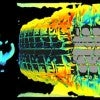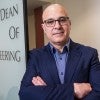
Researchers led by Rice’s Yong Lin Kong have developed a soft but strong metamaterial that can be controlled remotely to rapidly transform its size and shape.

Researchers led by Rice’s Yong Lin Kong have developed a soft but strong metamaterial that can be controlled remotely to rapidly transform its size and shape.

New Mars research reveals multiple episodes of habitability in Jezero Crater
New research using NASA’s Perseverance rover has uncovered strong evidence that Mars’ Jezero Crater experienced multiple episodes of fluid activity — each with conditions that could have supported life.

From Texas to Rajasthan: Rice senior explores nutrition, public health abroad
This summer, Rice senior Maya Harpavat traded the lecture halls of Houston for the winding roads of Rajasthan, India.

Recent research from Rice and Houston Methodist shows how data-driven methods can sharpen doctors’ decisions for patients with aortic regurgitation, a common heart condition where the heart valve doesn’t close properly and blood leaks backward into the heart.

New climate models to reveal secret life of water
A project led by Rice and the U.S. National Science Foundation National Center for Atmospheric Research will build a new and improved version of the Community Earth System Model, which can trace water across the entire planet from the clouds in the sky to the thick ice sheets deep underground.

For more than three decades, Tayfun Tezduyar has been developing and refining space-time computational flow analysis, a framework he introduced in 1990 for solving some of the toughest real-world problems in fluid dynamics.

Rice researchers turn wasted data center heat into clean power
A new study from Rice shows how to turn data center waste into power.

Folding the future: Origami helping Rice engineer Novelino transform materials, structures
Larissa Novelino has built her research on a surprising foundation: the centuries-old Japanese art of paper folding.

After spirited O-Week, Owls start new semester with ‘sense of unity’
Rice marked a historic milestone this month as it welcomed the largest incoming class in its history — 1,336 new Owls, including 63 transfer students. With traditions both new and old, O-Week gave first-year students and their families a warm introduction to the campus community.

Rice scientists launch powerful new online tool to streamline mineral identification
A team of researchers at Rice has developed MIST — Mineral Identification by Stoichiometry — the first online tool capable of automatically identifying hundreds of different mineral species from their chemical composition using a carefully designed rules-based algorithm.

A collaboration between Rice, Baylor College of Medicine and Texas Children’s Hospital’s Jan and Dan Duncan Neurological Research Institute (NRI) has produced a breakthrough in how to study and classify complex diseases.

AI can help communities prepare for, respond to climate risks during peak hurricane season
As the Gulf Coast heads into the most active stretch of the Atlantic hurricane season — August through September — forecasters warn the region could face heightened storm activity this year, fueled by warm ocean waters and a changing climate.

Rocketing to the top: Rice Eclipse claims victory at world’s largest collegiate rocketry competition
Rice’s largest engineering and student rocketry club, Rice Eclipse, soared to new heights this summer, taking top honors in the 30,000-foot Student Researched and Developed Hybrid Division at the 2025 International Rocket Engineering Competition.

Rice geoscientist honored with Geological Society of America’s Woollard Award
Richard Gordon, the W.M. Keck Foundation Professor of Geophysics, Earth, Environmental and Planetary Sciences at Rice, has been named the 2025 recipient of the George P. Woollard Award from the Geological Society of America.

Luay Nakhleh, dean of the George R. Brown School of Engineering and Computing, has received a $1.9 million grant from the National Science Foundation to build a powerful new software infrastructure that could significantly expand how scientists study evolution.